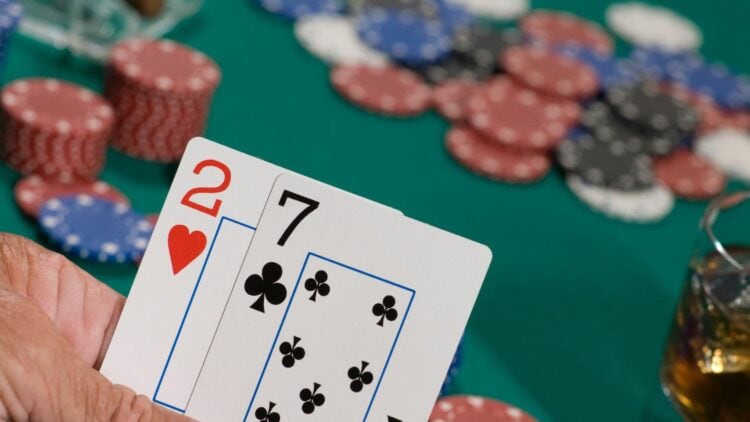
On the surface level, poker is one of the most simple card games out there, but in reality, it is an extremely complex and strategic game. It can take years to master poker, so knowing the best strategies is imperative.
In this article, we will dive into 14 of the most important poker strategies that will help you improve your game. So ante up and get ready to start playing poker!
Still an absolute beginner? Our beginner’s guide to poker is a great place to start.
1. LEARN TO BLUFF
One of the most fundamental strategies in poker that every player must learn is bluffing.
You can think of bluffing as a form of deception to encourage players to play their hand differently than they would if they could see the deceiver’s hand.
If you have a weak hand, you can bluff to get other players with potentially stronger hands to fold.
For example: You are playing Texas Hold’em, and your cards are a 7 and a 4. The “flop” comes down as 10, Queen, and 8. You may not have a good hand, but this doesn’t mean you have no chance of winning. Your choices are essentially to either fold early or bluff, raising the pot and attempting to make other players fold.
There is also the semi-bluff, which is used in poker games where players have the chance to improve their hands. Players may bet high on their hands to force players with weak hands to fold while they improve the strength of their hand (and odds of winning the pot).
2. PATIENCE IS KEY
While bluffing is one of the most important strategies in poker, you shouldn’t use it in every round. In fact, many poker experts claim that you should be folding around 60% to 75% of your hands! So, you should learn which card combinations to fold on, be patient, and wait for a good hand.
If you are dealt a bad hand, your best course is to fold immediately. Most hands you are dealt in poker are losers, especially in large poker games with 8 to 10 players. This is one of the most difficult strategies to nail for new poker players, as many want to play every round. But, generally, you should only be actually playing in 10 to 20% of the rounds.
This isn’t to say that you should only play on high cards, but, you’ll lose money if you consistently play on bad hands. That said, as you get better at the game, you’ll learn how to play on weaker hands and can fold less often.
3. BUILD THE POT ON STRONG HANDS

When you are dealt a good hand, you want to maximize your winnings and play aggressively. There is nothing more tragic than revealing a monster hand on the showdown only to collect meager winnings. For the sake of varying your play, you shouldn’t always raise the pot on strong hands, but doing so will force your opponents to either meet your bet or fold.
Building the pot is a delicate dance of enticing opponents without sounding the alarm bells and causing suspicion. If you bet too high, your opponents may fold. Building a poker pot is a fairly complex strategy that essentially comes down to how you vary your betting style throughout the game.
If you want more info on poker betting limits and more, check out our post on poker betting rules.
4. WATCH YOUR OPPONENTS
Keeping a close eye on your opponents is a game-changing poker strategy. Remember, your cards are only “bad” or “good” depending on the hands that other players at the table have. While you won’t be able to literally look at a player’s hand, you can make an educated guess based on their playing styles and “tells”. A tell is a signal from a player that they have a bad or good hand.
For example, a player has been consistently calling and checking and then suddenly makes a massive bet after the flop. Chances are, the player has a very strong hand that they are confident will win.
Here are a few examples of “tells” in poker.
- Eye contact
- Glancing at chips
- Changes in bet sizes
- Change in table talk
- Nervous behavior
5. POSITION IS POWER
The table position refers to where players are seated around the poker table and the outcome of this arrangement strategically.
Choosing your spot at a poker table isn’t just about finding a comfortable seat. In fact, your seat position is very strategic. Players who bet first or second typically need stronger hands so they can match the bets of later players. These players have the least amount of information when betting, so they are at a disadvantage. These players are also typically forced to make blind bets, which are small bets made before seeing their cards.
It is generally better to sit later in the betting rotation as you can respond to the earlier players by folding before making a bet, calling, or raising.
6. AVOID TILTING
“Tilting” is a state of emotional frustration or agitation in a poker game that affects a player’s decision-making. This can lead to poor decision-making and, ultimately, losses. Poker can be a frustrating game to play, especially for beginners, and it is common for players to start playing less strategically when they feel that their luck is running out.
Learning how to avoid “tilting” in poker is a fundamental pillar of discipline in the game and can significantly improve your game.
Tilting can cause you to play irrationally and play hands that you would normally fold on. If you are unable to think clearly during a poker game, you are VERY likely to continue losing.
7. LEARN WHEN TO “FLOAT”
Floating is a poker term that refers to calling on the pre-flop with a relatively weak hand to capitalize on the community cards or bluffing. This is an excellent poker strategy that takes time and expertise to master, but it can be extremely effective if done correctly.
In order to effectively “float,” you’ll need to read your opponents and know when and where to place the bluff. This strategy is a great way to avoid folding too often. As mentioned above, 60% to 75% of your poker hands will not be winners, but instead of folding every time you pick up a cruddy hand, you can bluff or float to keep your opponents guessing!
8. MIX UP YOUR PLAY
If there is one thing you should take away from this guide to poker strategy, it is that mixing up your playing and betting style is imperative. You should always maintain some level of unpredictability in your poker playing style to keep your opponents guessing. This allows you to bluff more often and gives you a powerful edge at the table. If your opponents cannot read your play, you will be able to exploit their weaknesses and ultimately win more hands.
Mixing up your poker strategies and playing style is something that comes with practice. The more you play and the more comfortable you get with the game, the better you will be at being unpredictable.
You should also learn the different poker games and mix up the games you play. Texas Hold’em is certainly the most popular, but 5 card draw, Omaha poker, and HORSE poker are also super popular.
9. MANAGE YOUR BANKROLL

This is an important one. Your bankroll is the amount of money you have to play with at the poker table. As you probably already know, poker is a gambling game in which players bet real money. It is extremely important to understand how to manage your bankroll and to NEVER bet more money than you are willing to lose.
While poker is a game of skill, luck still plays quite a big role. The way the cards fall can affect your play and, ultimately, how much money you lose, so it is crucial to play with discipline. Without proper bankroll management, you could end up losing large sums of money you aren’t prepared to lose.
There are a few key components that you’ll need to follow when managing your bankroll:
- Only risk money you are OK with losing
- Play patiently when growing your poker bankroll
- Understand the different “stakes” and only play at tables with stakes aligning with your skill.
Managing your bankroll not only prevents you from emptying your wallet into a poker game, but it also allows you to play more poker.
For example, if you have $50 that you are willing to lose in a poker game for the next money and you lose it all in a single game, you won’t be able to play any more poker. But, if you manage your bankroll properly and only bet $20 in a single game, you’ll still have $30 to play with.
10. CALCULATE POT ODDS
Learning how to calculate pot odds in poker is an important skill that forms the bedrock of analytical decision-making in a game. Pot odds are simply a ratio of the size of the pot and the size of the bet you need to place. Learning to calculate pot odds will help you to determine whether a bet is worth it for you. For example, if the pot is only $4, and you need to place a $2 bet to call, the pot odds are 2:1, meaning you need to place a bet worth half of the pot to play. In this case, the ratio of your potential winnings to the bet you must place is not very high.
In another example, the pot is $100, and you only need to place a bet worth $20 to call. These odds are 5:1, meaning your potential winnings are five times greater than your bet.
You must then compare the betting ratio to your hand. If you have an extremely good and rare hand, you will more likely take the bet at worse pot odds, but if you don’t have as good of a hand, you are better off folding than risking a bet worth a larger percentage of the pot.
By comparing the potential winnings to the cost of staying in the game, you can make informed choices about calling, raising, or folding.
11. KNOW WHEN TO CALL, RAISE, OR FOLD

This goes along with other strategies and tips we have talked about already, but knowing when to call, raise, or fold in poker is obviously one of the most fundamental aspects of poker strategy.
Poker is a complex game, and the reasons a player will call, raise, or fold may differ depending on how aggressively or slowly they play the game. Let’s take a look at some common reasons to call raise or fold.
REASONS TO CALL
- Conceal hand strength
- Set up a bluff or long-ball bluff
- Change pot odds
- Avoid another player re-raising or being forced to re-raise
REASONS TO RAISE
- Increase value of pot if you have a strong hand
- Force other players out with weaker or stronger hands
- Bluff or semi-bluff
- Earn a free card (applies only to poker games that allow you to improve your hand)
- Learn about opponent’s hands from their reactions (calling, folding, and re-raising)
REASONS TO FOLD
- You have a poor hand and expect other players to have stronger hands
- A player who rarely bluffs is making big bets
- You don’t have the right pot odds to call
- You have been playing aggressively and want to switch up your play style
12. HAND READING AND LEVELING
Hand reading is a process of narrowing down the possible hand your opponent has based on their actions throughout the game and the order in which they happened. You are not trying to literally determine what their hand is, but rather a range of what it could be. This can also be done in reverse, thinking of the anti-range, as in what cards they don’t have.
Leveling, referred to as multi-level thinking, is a strategy that focuses on considering what other players think about all the hands. If thinking about what your opponent has in hand is level one, thinking about what they think about other hands is level two. This includes thinking about what opponents think about another opponent’s hand and their own.
13. PLAY WITH LONG TERM GOALS
Poker is not a game you’ll master in one, two, or even ten games. Learning poker strategy takes time, and you should treat your poker playing as a long-term commitment. When you first start off playing, you should be prepared to lose. Winning and moving up in stakes takes time. Remember, poker is a game of skill, so the more skilled you become, the higher you will move in the stakes and the more money you will win.
But it is important to start slow and think in the long term. Set goals such as moving up in the stakes, winning more consistently, and playing in a tournament.
14. ONLY PLAY GAMES YOU ENJOY
Poker is a complex and often intense game that is played at a professional level, but it should still be fun. A top tip for getting better at poker is to make sure you only play games you actually enjoy. If the environment is stressful, you are more likely to “tilt” if things go sour. A stressful game also will generally make you play more conservatively, preventing you from experiencing new strategies. While advanced poker players will undoubtedly find themselves in intense, high-stakes competitions, beginners should start off playing in casual environments with lower stakes.
15. LEARN FROM YOUR OPPONENTS
There is nothing worse than losing in poker. But, instead of feeling down about your losses, you should be taking notes. In our opinion, the best way to learn is to lose! You can learn a lot about the game and what to do differently by analyzing your opponents’ strategies. Your competitors can show you different strategies and make you more aware of different situations in a poker game. If you are new to the game and you lose badly, you can even ask the opponents what you did wrong. Were you too easy to read? Did you bet too hard on good hands? Did you fold too often?
You can read a million poker strategy books and analyze every card combination in the game, but in reality, the best way to improve is through trial and error.
POKER STRATEGY MADE EASY!
Poker is not simply a gambling game. Mastering the art of poker requires strategy, adaptability, and a deep analytical understanding of the game. The 15 poker strategies we have provided you with today will help you become a better player and win more games! So, if you are feeling down about losing some games, take some time to learn the strategy and learn from your loses, you’ll be raking in the winnings in no time.
- 30 GAMES TO PLAY OVER TEXT - April 22, 2024
- 20+ FREE PRINTABLE BABY SHOWER GAMES - April 16, 2024
- 20+ College Party Games for the Best Night Ever! - April 2, 2024